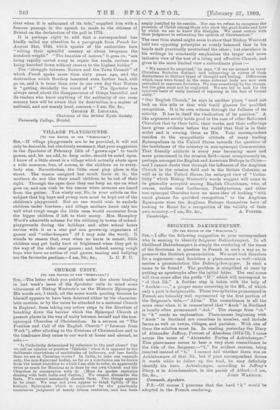CHURCH UNITY.
LTO THR EDITOR OP THE " SP ROTATOR.' j
SIR,—The letter which you publish under the above heading in last week's issue of the Spectator calla to mind some utterances of Bishop Westcott's on the Historic Episcopate. His words are, I think, all the more worth quoting because be himself appears to have been deterred either by his character- istic caution, or by the value he attached to a national Church in England, from taking any active steps in the direction of breaking down the barrier which the Episcopal Church at present places in the way of unity between herself and the non- episcopal Churches of Christendom. In a sermon on "The Position and Call of the English Church " ("Lessons from Work"), after alluding to the divisions of Christendom and to the hirtdrance they cause to our work at home and abroad, he asks :—
"Is Catholicity determined by reference to the past alone P Can we call an opinion or practice Catholic' when it is opposed to the deliberate convictions of multitudes of believers, not less fertile than we are in Christian works P In India, to take one example only, the non-Episcopal bodies, as far as a conclusion can be drawn from the latest statistics to which I am able to refer, do apparently twice as much for Missions as is done by our own Church and the Churches in communion with it. [Here he quotes statistics dealing with both India and Ceylon.] We cannot dissemble the facts. We cannot summarily dismiss them. Two things appear to be clear. We may not even appear to think lightly of the historic Episcopate which is supported by the practically unanimous judgment of nearly 'ilf teen centuries, and has been amply justified by its results. Nor can we refuse to recognise the presence of Christ among those who show the good fruits and love by which we are to know His disciples. We must reckon with their judgment in estimating the opinion of Christendom."
The case thus stated might seem to show that Bishop Westdott held two opposing principles so evenly balanced that in his hands each practically neutralised the other ; but elsewhere in his writings he constantly emphasises the larger and more inclusive view of the test of a living and effective Church, and gives to the more limited view a subordinate place
"We cannot be surprised," he says, if we see around us many Christian Societies distinct, and subserving in virtue of their distinctness to distinct types of thought and feeling. Differences which once were found in the same external body are now seen embodied in separate Societies. We lose something by the change, but the gain must not be neglected. We are led to look for the spiritual basis of unity instead of reposing in the fact of formal unity."
"Our English Church," he says in another place, "need not look on this side or that with timid glances for qualified recognition. It is its own witness through the fullness of its activity. It has in itself the vindication of its position." A like argument surely holds good in the case of other Reformed Churches that by their faith, their works, and their sufferings have given evidence before the world that God is in their midst and is owning them as Hie. Your correspondent testifies to the sympathetic attitude of many leading Episcopalians in the United States towards the question of the lawfulness of the ministry in non-episcopal Communions. That friendly attitude is every year becoming more and more pronounced, in the mission field—most conspicuously so, perhaps, amongst the English and American Bishops in China— and I cannot doubt that through the influence of the Anglican Church in the mission field and in the British Colonies, as well as in the United t3tates, the enlarged view of " Catho- licity " which Bishop Westeott's words suggest will come to be generally accepted among English Churchmen, who, of course, realise that Lutherans, Presbyterians, and other non-episcopal Churches have no more idea of looking "with timid glances for qualified recognition" to the Anglican Episcopate than the Anglican Bishops themselves have of looking to Rome for a recognition of the validity of their






































 Previous page
Previous page